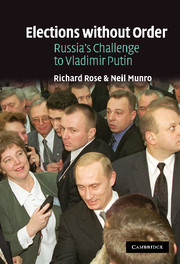Book contents
- Frontmatter
- Contents
- List of figures
- List of tables
- Introduction. The reality of Russia
- 1 A disorderly legacy
- 2 Democratization backwards
- 3 What Russians have made of transformation
- 4 Presidential succession: a Family problem
- 5 Parties without accountability
- 6 A floating system of parties
- 7 Impact of transformation on Duma voters
- 8 From acting to elected president
- 9 Campaigning and governing
- 10 In search of an equilibrium
- Appendix A New Russia Barometer samples
- Appendix B Coding of independent variables
- References
- Index
7 - Impact of transformation on Duma voters
Published online by Cambridge University Press: 22 September 2009
- Frontmatter
- Contents
- List of figures
- List of tables
- Introduction. The reality of Russia
- 1 A disorderly legacy
- 2 Democratization backwards
- 3 What Russians have made of transformation
- 4 Presidential succession: a Family problem
- 5 Parties without accountability
- 6 A floating system of parties
- 7 Impact of transformation on Duma voters
- 8 From acting to elected president
- 9 Campaigning and governing
- 10 In search of an equilibrium
- Appendix A New Russia Barometer samples
- Appendix B Coding of independent variables
- References
- Index
Summary
In a society in transformation, the big questions facing voters are much bigger than in an established democratic system, and this is especially true in Russia. Ideology and interests make transformation divisive. Those who were accustomed to or benefited from the old regime will be unhappy, while those who could not wait to be free of it will prefer the present and look forward to the future. Many people are of two minds about transformation, for example, liking newly gained personal freedoms while being disturbed by economic insecurity. Therefore, parties can compete by being for or against transformation – or they can blur their positions to attract the support of voters confused or uncertain in the face of change.
In an established democratic system, parties do not compete by offering voters a choice between democratic and undemocratic regimes, and economic differences are about how a market economy ought to be managed rather than about whether markets should be introduced or avoided. In an established party system, competition is in equilibrium, for the same parties are on the ballot from one decade or one generation to the next, and most voters have a stable party identification. A system in equilibrium is adaptable rather than static, for parties change leaders and policies in pursuit of votes (Downs, 1957). In the short run, economic cycles can affect voting for the governing party and the opposition.
- Type
- Chapter
- Information
- Elections without OrderRussia's Challenge to Vladimir Putin, pp. 141 - 163Publisher: Cambridge University PressPrint publication year: 2002



